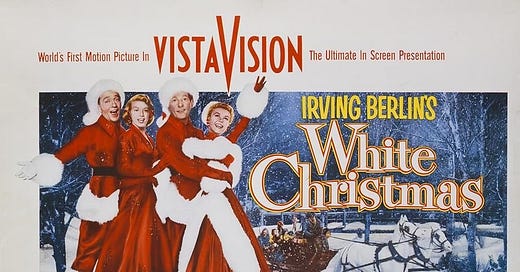Say What You Need to Say: Lessons from White Christmas
How a classic holiday film—and a John Mayer song—made me reflect on misunderstandings, miscommunication, and the power of speaking up
I’m a sucker for old Christmas movies. I’ve always been particularly fond of White Christmas—the music, the dancing, the glitzy set, the vernacular of the day. Bing Crosby with his light baritone voice. Danny Kaye—not handsome, but he danced like his body was made of rubber. Rosemary Clooney with her haunting resemblance to her nephew (not born yet when the movie was filmed) George Clooney. Oh, and Vera-Ellen’s microscopic waist is a whole other sad story.
But for now, I’m pondering Rosemary Clooney’s character and how a failure to “use her words” (I hate that expression, by the way, but it fits here…) set off a chain of events that led to a misunderstanding and unnecessary duress. A recap, in case you’ve never seen the movie and/or have seen it and don’t know what I’m talking about:
Two former WWII soldiers turned entertainers plan a Christmas show to save their old general’s inn. A misunderstanding causes a rift when Betty Haynes (Rosemary Clooney) mistakenly believes Bob Wallace (Bing Crosby) is exploiting the general for publicity.
This perceived exploitation inflames Betty. She reacts by doing a 180-degree shift from nearly melting in a puddle of schmoopy infatuation to turning into a stone-cold impervious bitch. She could have confronted the issue head-on by simply asking Bob if what she had heard was true, giving him the opportunity to explain. He might have even said something like this:
“Well, now, hold your horses, Betty! That’s a load of malarkey if I ever heard one. Do you really think I’d sell out the old man for a few bucks? Why, I’d sooner dance a jig in a snowstorm wearing Bermuda shorts. C’mon, give me a little credit, will ya?”
Instead, we get an hour or so of Bob and Betty parrying, Judy (Vera-Ellen) and Phil (Danny Kaye) scheming, and a lot of unnecessary drama. But then, of course, there wouldn’t be a movie, and the happy ending wouldn’t be as sweet and, well, schmoopy.
Mike and I watched White Christmas this past weekend, and I couldn’t stop thinking about John Mayer’s "Say (What You Need to Say)." Why is it so hard to just say what’s on our minds? I hate to admit it, but I’ve had my fair share of “Betty” moments—pouting and retreating instead of voicing what upset me. And now I’m left wondering: Why? What holds me back? I wish I knew.
Occasionally, I do step out of my comfort zone and speak up, but even then, I second-guess everything—what I said, how I said it, even the medium I used to say it.
Mayer wrote "Say" for The Bucket List, a song that drives home the truth that leaving things unsaid is rarely a good idea. One lyric always resonates with me:
"You better know that in the end, it’s better to say too much than never to say what you need to say again."
This principle rings especially true in conflict. It’s far better to address misunderstandings head-on than to let them fester into passive-aggressive bitterness—wasting precious time over something that could have been resolved with a single conversation.
Today, I’m promising myself to do better. Because I believe those lyrics: it’s always better to say what you need to say.





Thanks for reminding us of this great (silly) old movie. So much of literature is based on mis-communication, mis-understandings. What if Romeo and Juliet had had cell phones! Haha. But really, the topic you raise is so important. For me, the challenge is not so much to say what I feel, but to make sure I truly have heard what the other meant to say. Christmas is a great time for remembering to get to the heart of our communications. So thanks!
Thanks for sharing! I also love old movies and amazed at how conflict can build into chaos from a misunderstanding. Here's to fewer misunderstandings for 2025.